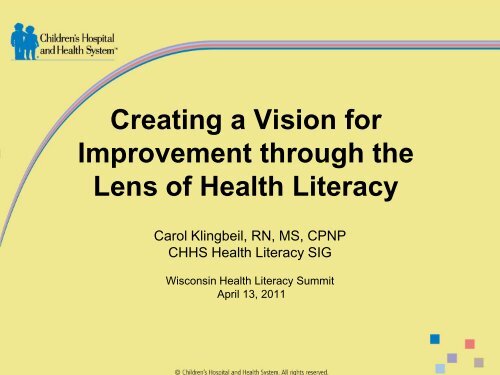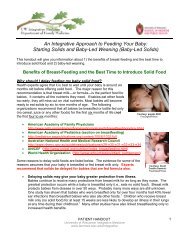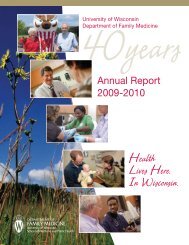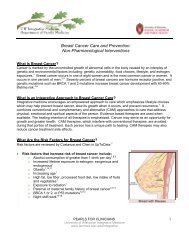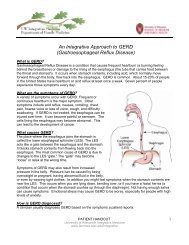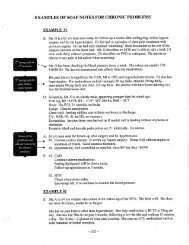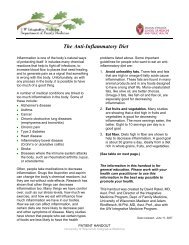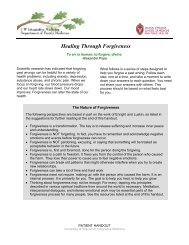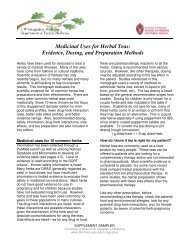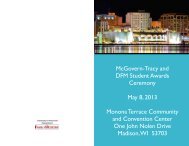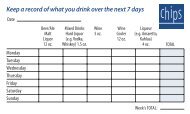Creating a Vision for Improvement through the Lens of Health Literacy
Creating a Vision for Improvement through the Lens of Health Literacy
Creating a Vision for Improvement through the Lens of Health Literacy
You also want an ePaper? Increase the reach of your titles
YUMPU automatically turns print PDFs into web optimized ePapers that Google loves.
<strong>Creating</strong> a <strong>Vision</strong> <strong>for</strong><br />
<strong>Improvement</strong> <strong>through</strong> <strong>the</strong><br />
<strong>Lens</strong> <strong>of</strong> <strong>Health</strong> <strong>Literacy</strong><br />
Carol Klingbeil, RN, MS, CPNP<br />
CHHS <strong>Health</strong> <strong>Literacy</strong> SIG<br />
Wisconsin <strong>Health</strong> <strong>Literacy</strong> Summit<br />
April 13, 2011
Objectives<br />
• Share <strong>the</strong> experiences <strong>of</strong> our organization<br />
with an improvement plan to improve health<br />
literacy <strong>for</strong> families.<br />
• Identify possible strategies to support health<br />
literacy initiatives in an organization.<br />
• Explore possible existing structure within an<br />
organization to move education and<br />
implementation <strong>for</strong>ward <strong>for</strong> improving health<br />
literacy.
Idea<br />
• Began meeting in early 2009.<br />
• Grassroots ef<strong>for</strong>t <strong>of</strong> multidisciplinary<br />
group.<br />
• Passion to create a culture sensitive <strong>the</strong><br />
health literacy needs <strong>of</strong> our families.
<strong>Vision</strong><br />
• Sensitize <strong>the</strong> entire<br />
organization to <strong>the</strong><br />
impact <strong>of</strong> low health<br />
literacy on quality and<br />
<strong>the</strong> safety <strong>for</strong> patients.<br />
• Connect health literacy<br />
principles to <strong>the</strong><br />
strategic plan.
Oh no, not<br />
ano<strong>the</strong>r<br />
initiative!
Passion and Partnership<br />
<strong>Health</strong> <strong>Literacy</strong> SIG partnered with <strong>the</strong> Family<br />
Advisory Committee (FAC) in 2009-2010 to focus<br />
on raising awareness.<br />
– Created a high-impact health literacy education<br />
tools.<br />
– Strategically identified and presented to over 40<br />
key stakeholder groups.<br />
– FAC focused on front-line staff education.<br />
– SIG focused on committees and initiative groups.
Linked to Strategic Plan<br />
• 2010: Linked to service<br />
excellence improvement <strong>for</strong><br />
entire organization, revised<br />
quality web-pages, and pilot<br />
<strong>for</strong> teach-back.<br />
• 2011: Specific projects <strong>for</strong><br />
improvement include in<strong>for</strong>med<br />
consent, teach-back, improved<br />
discharge process and intake<br />
<strong>for</strong>ms.
Jumpstarting <strong>the</strong> <strong>Vision</strong><br />
• 2009 Pfizer <strong>Health</strong><br />
<strong>Literacy</strong> Pr<strong>of</strong>essorship.<br />
• Touched over 400<br />
staff in 3 days.<br />
• Met with project teams<br />
to apply <strong>the</strong> lens <strong>of</strong><br />
health literacy and a<br />
patient-centered<br />
approach.<br />
• Engaged leadership to<br />
plan and sponsor <strong>the</strong><br />
event.
Where Did Increased Awareness<br />
and <strong>Creating</strong> a <strong>Vision</strong> Take Us?<br />
• Multiple groups identified projects and goals<br />
<strong>for</strong> 2010.<br />
• Excitement about a new look to an old<br />
problem!<br />
• Lots <strong>of</strong> ideas but limited experience <strong>for</strong><br />
mentoring and leadership.
Now What?<br />
How could we create passion and<br />
unity as an organization around<br />
health literacy practices?
Hosted a World Café<br />
Who:<br />
• 53 staff from 15 disciplines<br />
Questions:<br />
• What would a culture that is<br />
sensitive to <strong>the</strong> health literacy<br />
needs <strong>of</strong> our families look like?<br />
• How will your work contribute to<br />
creating that culture?<br />
• What are <strong>the</strong> barriers and<br />
facilitators to reaching your<br />
goals?
World Café Key Messages<br />
• <strong>Health</strong> literacy is family-centered and at <strong>the</strong><br />
core <strong>of</strong> a back-to-basics approach.<br />
• Teaching families is a skill that can’t be<br />
assumed.<br />
• People need a universal approach.<br />
• Don’t make assumptions.<br />
• Build on <strong>the</strong> patient family’s understanding.
Share <strong>the</strong> ideas and stories<br />
• One conversation at a time.<br />
• One presentation at a time.<br />
• Time and time again!!<br />
• Connecting with leaders.<br />
• Supporting on-going work.<br />
• Taking a risk to share<br />
resources and ideas.<br />
• <strong>Creating</strong> patient stories and<br />
telling <strong>the</strong>m time and time<br />
again.
2010 Goals<br />
• Created a <strong>for</strong>mal work group charter with<br />
administrative sponsors.<br />
• Mentored key groups with goals around<br />
health literacy projects.<br />
• Partnered with quality and outcomes to<br />
document changes in pilot areas.<br />
• Identified opportunities <strong>for</strong> research.<br />
• Stayed connected with leadership.<br />
• Presented work at national conference.
The Teach-Back Project: An<br />
Evidence-based Practice Project<br />
• A project to teach nurses<br />
to use teach-back and<br />
questions to check <strong>for</strong><br />
understanding.<br />
• Intervention took 20<br />
minutes to teach.<br />
• Pre- and post-survey.<br />
• Rich data <strong>for</strong> practice<br />
change and correcting<br />
misunderstandings.<br />
• Continuing rollout to<br />
multidisciplinary groups in<br />
2011.
Ambulatory Clinical<br />
Practice Council<br />
• Held “Competency<br />
Cruise” <strong>for</strong> 160<br />
staff.<br />
• Booth on health<br />
literacy.<br />
• Resources to<br />
increase awareness.
O<strong>the</strong>r 2010 Projects<br />
• Revised oncology trials parent in<strong>for</strong>mation.<br />
• Influenced existing HRSA grant to create curriculum<br />
<strong>for</strong> parents <strong>of</strong> children with special health care needs.<br />
• Mentored multiple students with materials, projects<br />
and presentations.<br />
• Engaged resident physicians in <strong>the</strong> work.<br />
• Consulted on over 35 projects or items.<br />
• Revised clinic letters.<br />
• Revamped patient education.
Goals <strong>for</strong> 2011<br />
Move beyond awareness to changing<br />
practice:<br />
•In<strong>for</strong>med consent project.<br />
•Intake <strong>for</strong>ms work.<br />
•Teach-back project moving from pilot to<br />
system-wide.<br />
•Research consortium study collaboration.<br />
•Continue partnership with FAC.<br />
•Implement EHR.
How do you know<br />
when you are really<br />
getting <strong>the</strong>re?
Indicators <strong>of</strong> success<br />
• Leaders start referencing <strong>the</strong> work.<br />
• Lots <strong>of</strong> consults.<br />
• Work is evolving and it is in line with health<br />
literacy strategies.<br />
• Staff talk about how <strong>the</strong>ir practices have<br />
changed.<br />
• Families start noticing and commenting<br />
<strong>through</strong> patient satisfaction surveys.
Pearls <strong>of</strong> Wisdom<br />
• Engage your leaders.<br />
• Tell <strong>the</strong> patient stories time and time again.<br />
• Show videos with <strong>the</strong> patient voice. Talk about <strong>the</strong>m.<br />
• Look <strong>for</strong> every opportunity to connect <strong>the</strong> work to<br />
safety, quality and cost reduction.<br />
• A grassroots ef<strong>for</strong>t keeps it with doers and not a lot <strong>of</strong><br />
cumbersome channels.<br />
• Meet monthly and set yearly goals.<br />
• Share your work at any opportunity you can.
<strong>Health</strong> <strong>Literacy</strong><br />
Special Interest Group<br />
• Carol Klingbeil, APN Ed. Services and EDTC—Lead<br />
• Tera Bartelt, APN Spina Bifida Program<br />
• Karen Schaefer, Ed. Services and Family Resource Center<br />
• Rhonda Werner, APN Neurology Clinic<br />
• Barbara Ruggeri, Medical Library<br />
• Kelly Felske, Patient Education Nurse, HOT Unit<br />
• Jennifer Flamboe, Interpreter Services<br />
• Lynn Doyle, APN Ed. Services<br />
• Debra Jablonski, Special Needs Program Case Manager<br />
• Anne Juhlmann, Special Needs Program and Family Resource Center<br />
• Laurie Smrz, Asthma Program Educator<br />
• Cindy Gore, Trach. Vent Program Clinician<br />
• Lynn Mellenthien, Clinic Nurse<br />
• Judy Russell, Fox Valley-Patient Care Support Services Manager<br />
• Laurie Newton, APN ENT<br />
• Jane Chevako, Urgent Care Physician<br />
• Sandy Dykstra, Social Worker<br />
• Laura Kerecman, Advocate <strong>for</strong> CCHP Manage Care Plan
Plant a seed and<br />
watch it grow!


